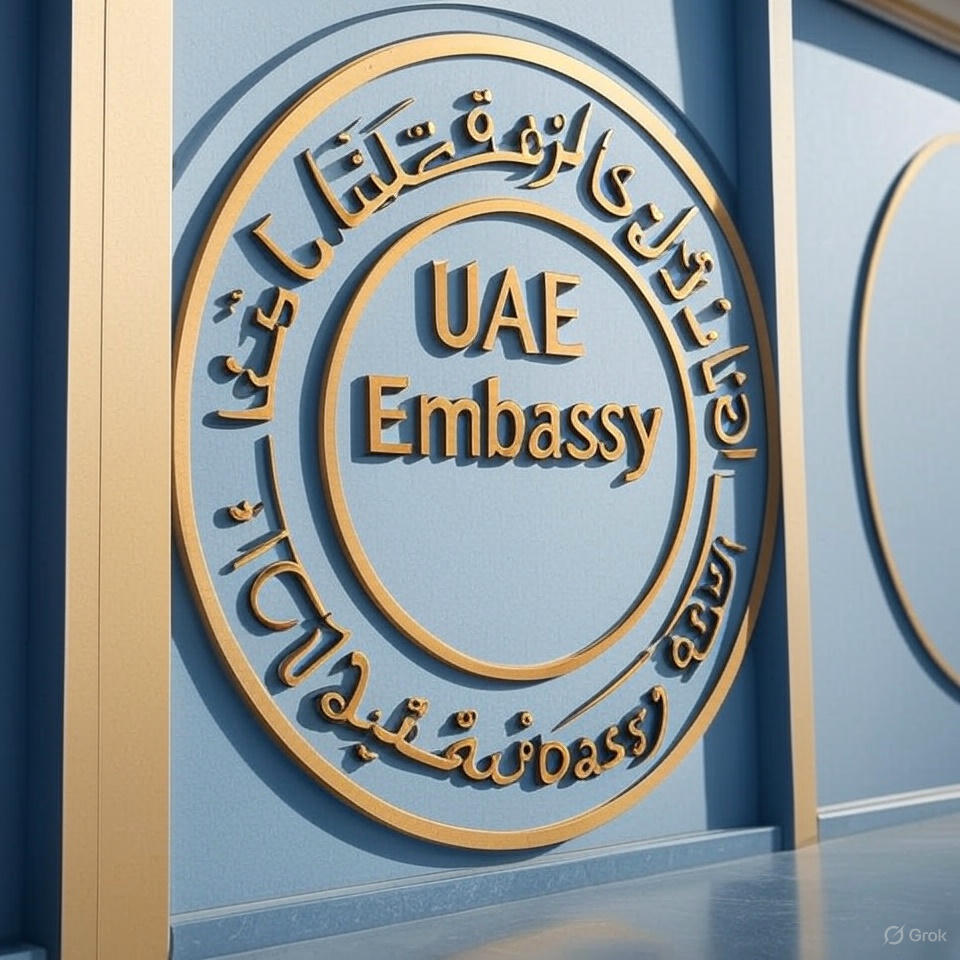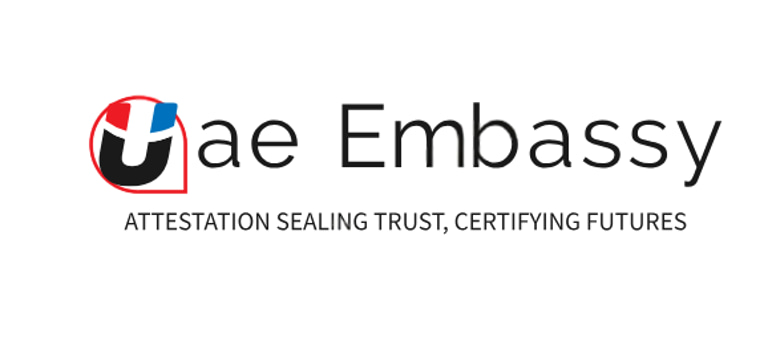UAE Embassy Attestation: Step-by-Step Guide
Learn the complete step-by-step process of UAE embassy attestation. This guide covers everything you need to know about the embassy attestation process to ensure your documents are verified correctly.
9/29/20257 min read


Introduction to UAE Embassy Attestation
UAE embassy attestation serves as a critical process for validating documents to be used in the United Arab Emirates. Essentially, this process involves obtaining approval from the relevant authorities, which ensures that the documents are genuine and officially recognized in the UAE. This is particularly important for those planning to relocate, study, or conduct business in the country, as the attestation offers an assurance of authenticity that is often required by institutions or government bodies.
The importance of UAE embassy attestation cannot be overstated. It acts as a formal endorsement that helps mitigate issues related to fraud and misrepresentation. By confirming the legitimacy of the documents, it enhances the credibility of the individual or entity presenting them, whether it be an educational certificate, a marriage certificate, or business-related documentation. This verification process is often a prerequisite for various administrative procedures, including visa applications, employment contracts, and educational enrollment.
Typically, several types of documents necessitate embassy attestation in the UAE. Educational certificates, including diplomas, degrees, and transcripts, often require verification to facilitate enrollment in universities or to obtain job positions. Furthermore, marriage certificates must also be attested to ensure marital status is officially recognized for residency or other legal purposes. Additionally, business documents, including MOUs, contracts, and incorporation papers, undergo this process to maintain compliance with the UAE's legal framework. Overall, the scope of documents requiring attestation is broad, contributing to the smooth functioning of administrative processes within the UAE.
Documents Required for Attestation
The attestation process is a crucial step for individuals intending to use their documents in the United Arab Emirates. To ensure a smooth and efficient attestation process, it is essential to gather all the necessary documents beforehand. Each specific type of document requires distinct attention, and preparing these in advance can significantly expedite your experience at the UAE embassy or consulate.
Firstly, original documents that require attestation must be collected. This may include educational certificates such as degree and diploma certificates, professional qualifications, and birth or marriage certificates, depending on the purpose of attestation. It is imperative to ensure that these documents are issued by recognized authorities to avoid any complications during verification.
In addition to the original documents, various photocopies will also be needed. Typically, a set of photocopies for each original document is required. This means you will need, at a minimum, two to three copies of each document. Furthermore, a valid form of identification, such as a passport or national ID card, must be submitted. This will serve to establish the identity of the individual seeking attestation and ensure that the documents correspond accurately to the requestor.
Moreover, the UAE embassy or consulate may require specific application forms to be filled out before initiating the attestation. These forms often ask for detailed information about the documents being submitted, the purpose of attestation, and the applicant's personal information. Additional requirements may vary based on the category of documents and the region within the UAE. Therefore, checking the official embassy website beforehand can provide clarity on the precise documentation needed for your situation.
Finally, it is advisable to have a checklist to ensure that all required documents are gathered efficiently. By doing so, applicants can enter the attestation process well-prepared, which can lead to a more streamlined experience at the embassy or consulate.
Understanding the Attestation Process
The attestation process for documents intended for use in the United Arab Emirates (UAE) involves a series of carefully outlined steps designed to ensure the authenticity and validity of those documents. Initially, individuals must prepare the necessary documents that require attestation. These can include educational certificates, marriage certificates, or any other official documents that need recognition in the UAE.
Once the documents are ready, they must be submitted to the relevant authorities in the country of origin. In many cases, this could be local government offices or designated centers that handle document verification. It is essential to ensure that these documents are duly notarized, as this is often a prerequisite for proceeding with the attestation process.
The next critical step involves the Ministry of Foreign Affairs and International Cooperation in the UAE. After submission to local authorities, the verified documents must be forwarded to this Ministry. They will conduct their own verification process, ensuring that all information is accurate and legitimate. The Ministry's role is integral, as it confirms the authenticity of the documents before they can be recognized by the UAE authorities.
Following the verification by the Ministry, the next stage is to get the documents attested by the UAE embassy or consulate in the home country. This step is crucial as it provides a final layer of verification and formally endorses the documents for use within the UAE. The documents must be presented along with any supporting paperwork requested by the embassy. This may include identification documents, a cover letter, and sometimes even a payment receipt for necessary fees.
Upon successful completion of these steps, individuals will receive their attested documents, which can then be used for various legal and administrative purposes within the UAE. This meticulous process ensures that all documents are properly validated, thereby facilitating smoother transactions and processes in the UAE.
Timeframe and Fees for Attestation
The timeframe and costs associated with the UAE embassy attestation process can vary significantly depending on several factors including the type of document, the service provider, and the urgency of the request. Generally, the entire attestation process can take anywhere from a few days to several weeks. For example, standard processing times for educational certificates may range from 7 to 10 working days, while commercial documents might take longer, lasting 10 to 15 working days. On the other hand, some expedited services can significantly reduce these timeframes, allowing for document processing in as little as 24 to 48 hours.
It is important to note that potential delays may arise due to various reasons, such as incomplete documentation or changes in governmental procedures. Submitting the required documents well-prepared can mitigate such delays and ensure a smoother attestation process. Also, clients are encouraged to confirm with their service providers about current processing times, as these can fluctuate based on seasonal workload or other conditions affecting embassy operations.
In terms of fees, the costs associated with UAE embassy attestation include embassy fees, service charges, and additional expenses that may apply depending on the urgency of the request. The embassy fees can differ based on the document category. Service charges typically range from 100 to 300 AED, influenced by the complexity of the service. If expedited processing is needed, additional charges may apply, which can go up to 50% more than the standard fee. Therefore, it is crucial to consider these factors when budgeting for the attestation process, ensuring that you account for the potential variation in both timeframes and costs.
Common Mistakes to Avoid During Attestation
Attesting documents for use in the United Arab Emirates (UAE) is a meticulous process, and errors can lead to significant delays and additional expenses. One of the most common mistakes individuals make is insufficient preparation of the required documents. Each type of document, whether it be educational certificates, marriage licenses, or medical reports, has specific prerequisites that must be met. Failing to gather all necessary original documents, copies, and supporting materials can halt the attestation process, resulting in unnecessary complications.
Another prevalent mistake is overlooking the detailed guidelines provided by the embassy or consulate. Each embassy may have particular procedures for attestation; not adhering to these can lead to rejections or requests for additional information. For instance, documents may need to be notarized or certified by relevant authorities before submission. Always double-check the official embassy website or contact them directly for clarification to avoid confusion regarding the submission procedures.
Time management is also critical during the attestation process. Many individuals underestimate the time required for document verification and approval. As a result, they may submit requests last-minute, leading to rushed applications that may not comply with all requirements. Planning ahead can help ensure that you allocate enough time for each step, from gathering documents to receiving the attestations back, thereby reducing stress and the risk of premature submission.
Moreover, staying updated on the current policies of the UAE embassy is crucial, as regulations can change. Some individuals make the mistake of relying on outdated information, which could lead to unsuccessful applications. Avoiding these pitfalls will not only save time and money but also ensure a smooth attestation experience, allowing for a successful transition to your endeavors in the UAE.
Post-Attestation Steps
Once your documents have been duly attested by the UAE Embassy, it is essential to understand the subsequent steps to ensure that they are appropriately utilized for various purposes, such as visa applications, job placements, or residency processing in the UAE. The attestation of your documents signifies their authenticity, which is a crucial requirement for different legal and professional contexts within the country.
The first step is to verify that the attestation seals and signatures are clear and legible on each document. This verification ensures that your paperwork will be accepted without issues when presented to respective authorities or employers in the UAE. After confirming this, you should make multiple copies of the attested documents. These copies can be handy, particularly when attending interviews or submitting applications, as it is common for both organizations and immigration authorities to request copies along with the originals.
In many cases, additional certifications might be required based on the nature of your intended application. For example, if you are applying for a job, certain sectors may demand specific qualifications to be authenticated further. Similarly, when submitting documents for residency processing, further verification from relevant educational institutions or professional bodies may be necessary. Therefore, it is wise to research and prepare any extra documentation required well in advance in order to avoid delays.
Moreover, it is advisable to keep track of your deadliness regarding visa applications or other formalities related to residency and employment, as many processes are time-sensitive and can require numerous steps. Ensure that you stay informed about the latest regulations and requirements by consulting official UAE government websites or seeking guidance from experts in immigration services. By diligently following these post-attestation steps, you can navigate the UAE's bureaucratic landscape more smoothly and effectively.
Conclusion and Helpful Resources
In conclusion, the process of UAE embassy attestation is a critical step for individuals seeking to ensure that their documents are recognized and validated within the United Arab Emirates. Throughout this guide, we have covered the essential elements, including the required documents, the step-by-step procedure, and the various authorities involved in the attestation process. Understanding these aspects is vital for a smooth transition and compliance with the UAE's legal requirements.
Emphasizing the significance of proper attestation cannot be overstated, as it mitigates potential issues related to foreign documentation in the UAE. Whether for employment, education, or residence purposes, attesting your documents correctly lays the foundation for a hassle-free experience in the country. Ensuring that all paperwork is appropriately authenticated helps in avoiding delays and misunderstandings that could arise due to unverified documents.
For readers seeking further information or assistance, several resources are available. Official government websites provide comprehensive details about the attestation process and list the necessary contacts. The UAE Ministry of Foreign Affairs & International Cooperation is an excellent starting point for understanding attestation requirements and procedures. Additionally, FAQ sections on these official sites often address common queries, helping alleviate any uncertainties.
For personalized assistance, consider reaching out to local embassies or consulates, which can offer guidance based on your specific circumstances. Many consulates also maintain helplines for direct support regarding attestation queries. Utilizing these resources will equip you with the knowledge and help needed to navigate the attestation process with confidence and ease.
